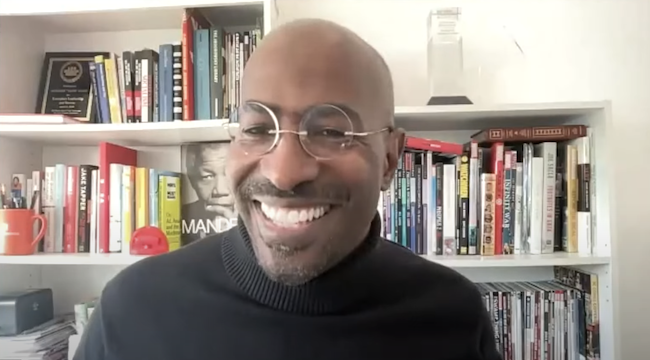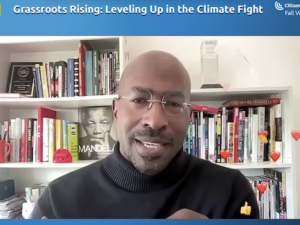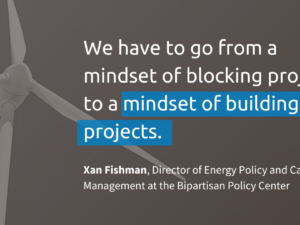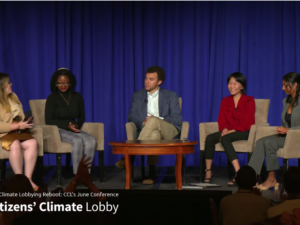Van Jones weighs in on climate and collaboration
By Samantha Johnstone
Van Jones — CNN host, bestselling author and social justice activist — delivered a keynote message to CCLers across the country as part of this year’s Fall Conference. Many know him for his 2017 book, “Beyond the Messy Truth: How We Came Apart, How We Come Together,” the founding of many enterprises such as Dream.org, Color of Change, REFORM Alliance, the Ella Baker Center for Human Rights, and for his work on the Green Jobs Advisory in the late 2000s.
His keynote message explored the value of working together and the importance of relationships as we work for climate policy progress. Jones also touched on the history of the push for a carbon price, and the ongoing need for major legislation to reduce emissions.
Watch his keynote here, or read on for a recap:
We have to work together
“I like doing bipartisan work … because it’s just a smart way to do it,” Jones said. “Republicans don’t win every election. Democrats don’t win every election. But we’ve got to have a stable governing majority for the next two or three decades to solve this problem.”
This model of thought has brought Jones and his colleagues immense success over his three-decade long career. “Reaching across the aisle, as my team and I have done on criminal justice and also climate, there’s some stuff that we’ve learned,” Jones said, such as the importance of language.
“I do think that sometimes we get hung up on language. I find it’s much better to agree on a principle and let other people say it however they want to, then to try and fight people to have my language. If somebody doesn’t want to use the term climate, that’s fine. Don’t fight them if climate is a dirty word in their coalition.”
He emphasized that we can’t just hide in our own corners, hoping that people we agree with win office. Instead, we need to focus on being “as big tent as possible, as inclusive as possible.” In other words, we need to include everybody in our movement and help both parties to speak to their constituencies in a way that makes sense to them. If we can “help both political parties develop real champions on this issue,” he says, “we can ultimately prevail.”
We have to lean into relationships
“Friendships matter. And to have a friend, you need to be a friend,” Jones remarked.
He shared an anecdote about Newt Gingrich, who co-starred with him on a show called “Crossfire.” Jones, a liberal, and Gingrich, a conservative, would debate political topics on air in heated arguments. Although they had many differences, Jones explained that off the air, they developed a close friendship by discovering their overlapping interests around addiction, youth in trouble, and criminal justice. From there, he was introduced to Gingrich’s friends and continued to expand his social circle.
This relationship opens up new possibilities. “We don’t have to agree on 99 issues. But the fact that we have warm regard for each other means that in that 1% moment, where something could get done if we came together, that is available,” Jones said.
And in fact, the two were able to accomplish much together, including their bipartisan support in passing the First Step Act, a criminal-justice reform law.
“It’s about listening. It’s about understanding the other person’s information environment. It’s about investing in relationships over time,” Jones said.
We still need a carbon price
Jones also stressed the need to put a price on carbon, referencing his work with the Obama administration back in the early days of 2009.
“In those days, look, we had a $387 billion stimulus. $80 billion were for clean and green solutions … [and] that government outlay was just a down payment. It was just to prime the pump. What was supposed to happen was that we would then have a price on carbon that was going to generate trillions of dollars into this field,” Jones said.
The expectation was that a cap-and-trade bill would be instituted as a follow up, allowing money to flow from the private sector into clean and green solutions. But without that, Jones said, America lost out on 15 years of what should have been aggressive price signaling, innovation, invention and investment.
“America’s government [failed] to follow up on that 80 billion of public money with trillions of private money by sending the right price signals,” Jones said. “That may wind up being the most critical failure in the history of our species because now we are facing a real set of challenges.”
He pointed out that we still lack the most important tool: “a true price signal.” If America put a price on carbon, the “magic of the market” could take us across the finish line.
Still, President Biden’s climate leadership and the “breakthrough” of the Inflation Reduction Act mean that “we are in a completely different world” compared to 15 years ago.
Jones celebrated the role of grassroots advocates in making those changes possible. “It’s because of you. It’s because of you and people like you going out of your way […] all fighting to try to get this done. Without your sacrifice, we wouldn’t be here.”
Samantha Johnstone is an intern with CCL’s Communications team. Class of 2026 at Cornell University, she is studying Environment & Sustainability with an emphasis in environmental humanities and double majoring in Communications. Originally from the Bay Area, she is part of the San Mateo County CCL Chapter.






